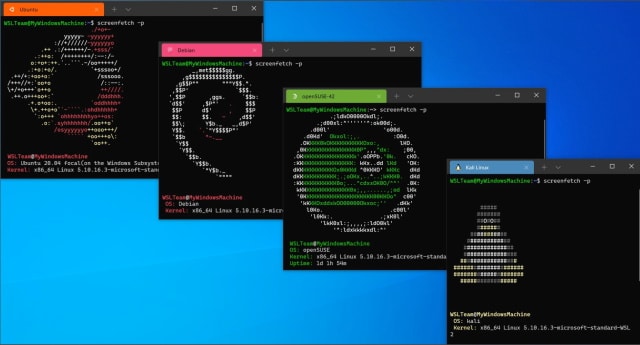Microsoft and Canonical bring systemd support to Windows Subsystem for Linux

Microsoft continues to show a surprising level of love for Linux, and nowhere is this clearer than in the Windows Subsystem for Linux. With the latest version of the software, the company has worked with Canonical to bring systemd support to WSL for Windows 11.
What does this mean in practice? It means that as of Windows Subsystem for Linux 0.67.6 there is support for Ubuntu's snap installation method. But there is much more to the arrival of system support than this.
See also:
- Microsoft may have released Windows 11 2022 Update, but the best updates are coming in October
- Microsoft releases KB5017383 update for Windows 11 with huge widget changes and fixes for lots of issues
- Microsoft releases Windows 11 2022 Update -- here's what new and how to get it
Described as a "suite of basic building blocks for a Linux system", the arrival of systemd support is a significant advancement for Windows Subsystem for Linux. Microsoft says that adding support meant making changes to the WSL architecture.
The likes of Debian and Ubuntu run systemd by default, and Microsoft says that WSL will be even more similar to using your favorite Linux distros on a bare metal machine. Of course, it will also let you use software that depends on systemd support, and the company also shares a few examples of Linux applications that are systemd dependent:
- snap
- A handy binary that allows you to install and manage software inside Ubuntu.
- Try running: snap install spotify or snap install postman
- microk8s
- Get Kubernetes running locally on your system quickly.
- Try the getting started tutorial
- systemctl
- A tool that’s part of systemd, interact with services on your Linux machine
- Try systemctl list-units --type=service to see which services are available and their status
Microsoft has published an interesting video in which it shares details of what the changes mean:
Microsoft explains how to use system:
To get started, you will need to do these two things:
– Ensure you are running the right version of WSL: Version 0.67.6 and above
– Set the systemd flag set in your WSL distro settings
The company also details how to ensure you have the correct WSL version:
This change is only available in the Microsoft Store version of WSL version 0.67.6 and higher. You can check your version number by running wsl --version. If that command fails then you are running the in-Windows version of WSL and need to upgrade to the Store version.
This version of WSL is now available in the Microsoft Store to users on Windows Insiders build for initial testing, and then after a few weeks we will make it available to all users to ensure quality. You can run wsl --update to check for any WSL updates.
If you are not on Windows Insiders and want to use it immediately, you can download the latest release from the WSL release page.
Over on GitHub, there full changelog for this version is available:
- Add official support for systemd! For more information, see our blog post here: https://aka.ms/wslsystemd
- Fix issue where X11 display might be running on the wrong channel
- Add retry around network endpoint creation to avoid temporary issues.
- Fix potential ERROR_FILE_NOT_FOUND errors when creating directories.
- Add a specialized error message if the distro VHDX can't be mounted
- Implement wsl.exe --update --web-download to allow updates directly from GitHub
- Update Microsoft.WSLg to version 1.0.44
- WSLg: Update WSLDVCPlugin to create shortcuts to packaged wslg.exe
- WSLg: Update WSLGd to use the msrdc execution alias
- WSLg: enable x server fonts installed at user distro
- Weston: rdp backend: fix applist is not working regression
- Weston: rdp shell: applist: verify file and directory explicitly
- Weston: rdp shell: locate icon for taskbar using window class name
- Weston: rdp shell: fix missing free
- Weston: rdp shell: preblend default icon image with default overlay image
- rdp shell: default window pos must be adjusted by window geometry
- xwayland: fix window maximizing
- xwayland: fix maximized window decoration
- Update Microsoft.WSL.Kernel to version 5.15.62.1
- Update to stable kernel version v5.15.62
- Re-enable the CONFIG_CEPH* flags
- Enable EROFS configs
- configs/wsl topic branch picked up (not currently in use)
- dxgkrnl driver branch refreshed with many fixes and upstream feedback revisions
- Hyper-V vPCI merge conflicts fixed for newer stable kernel releases
- Out-of-tree Hyper-V vPCI regression fix merged while waiting for upstream inclusion
- Addressed vulnerability assigned to CVE-2022-38014 in this release.
More information is available in the blog post.

Pingback: Microsoft and Canonical bring systemd support to Windows Subsystem for Linux - Internet Zilla
Pingback: Microsoft e Canonical trazem suporte ao systemd para o Home windows Subsystem for Linux – My Blog
Pingback: Microsoft and Canonical bring systemd support to Windows Subsystem for Linux – BetaNews – Nommu